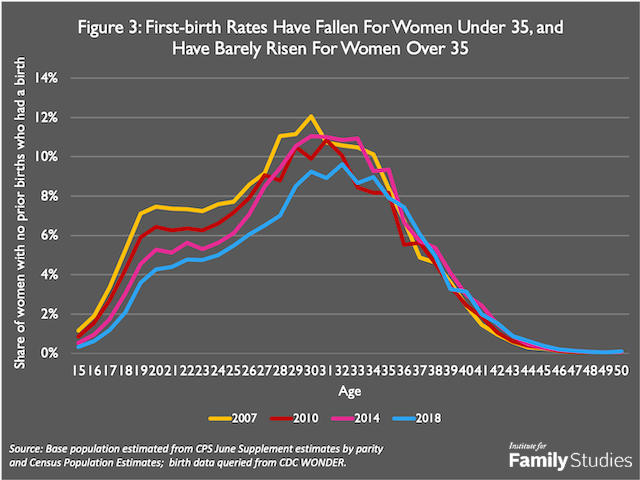Recently Newsweek hosted a pair of apposite and opposing articles considering the question, “Is America’s declining birthrate problematic?“
The “debate” (as it were) featured scholars Lyman Stone and W. Bradford Wilcox of the Institute for Family Studies on the affirmative side of the question, and professor and author Marina Adshade on the negative side.
To take the negative answer first, Adshade in her piece disputes even the premise of the question somewhat, claiming that there may be a problem in the mode of measurement giving a false indication of falling fertility. She writes, “[D]on’t let the numbers fool you—the downward trend is easily explained by the shift to women giving birth a little later in life, with the biggest effect coming from the decline in teen births. Women have not abandoned parenthood. They are delaying….”
Adshade celebrates the decline in teen births, attributing the accomplishment in part to the Obama Administration’s public subsidies for more widely available and more effective long-acting contraception for teens. She claims that this accounts for a lower “TFR” (total fertility rate, a predictive measure of how many children a woman will have over the course of her lifetime) but that this measure is misleading. She argues, “it is entirely possible that by the time this generation of women [i.e. the generation that avoided the higher teen pregnancy rates of the pre-Obama years] has reached an age of mid-40s, the average number of births will be greater than the number needed to keep the population constant. In fact, I would bet on it.”
This seems a dangerous bet. In part, this is so due to the issue of male-factor infertility which is becoming alarming more common. Adshade acknowledges that men are increasingly delaying becoming fathers just as much as, if not more than, woman are delaying motherhood; and she also rightly points out that “men consistently overestimate how easy it will be to have children when they are older,” and also points to the tendency of women to prefer marrying men slightly older than themselves. Nevertheless, she seems to pass too blithely over the male influence on the question of the total fertility rate (TFR) when placing her “bet” about an overall replacement-rate fertility being manageable with births delayed into couples’ forties and fifties. Recent research has pointed to very troubling trends in infertility generally, and male-factor infertility in particular: 1 in 6 couples desiring to conceive are diagnosed as having some degree of infertility; and 1 in 20 men face “reduced fertility” in either or both the forms of low sperm count and sperm quality. And what do some experts say might be partly to blame for this male-factor infertility? “The trend of delayed parenthood.“
What is more, artificial reproductive is not the panacea many think it is. Adshade says of men who delay fatherhood that they “underestimate how effective medical interventions are at overcoming the relevant problems,” but absent a source citation it is difficult to tell whether this is true. Perhaps this may be the case when speaking about interventions like pharmaceuticals that treat erectile dysfunction; but if it refers to the wider gamut of interventions, such as IVF, it seems less plausible that men underestimate the “effectiveness” of this treatment, which fails in most instances (of individual cycles) and whose “success rate” is only high if considered on a couple-by-couple basis relative to their overall course of treatment (with multiple failed attempts taken for granted as part of the process).
Stone and Wilcox, on the other hand, have a more bleak, but probably more accurate, view of the declining fertility rate in America and its potential consequences. While Adshade focuses very heavily on the question of choice and delay of birth via “family planning” in her dismissal of the fertility crisis, Stone and Wilcox point out that today “women are more likely to report that they didn’t have as many children as they wished to have—not that they had more children than they wished.” They observe that the data simply do not show a corresponding rise in later-in-life birth rates to allay fears about the corresponding drop in earlier births—by which they don’t just mean the teen births that Adshade seems to rely on which are a bit of a red herring.

Perhaps the greatest contrast between these authors’ points of view relates to their prognoses for the future. Adshade says of those who perhaps delay or entirely forgo having kids, that “[She] feel[s] confident that childless adults will create their own social networks to fill any void that might be left by not having had families of their own.” But against that optimistic outlook, Lyman and Stone call to mind the timely and troubling image of the shockingly high death rates in nursing homes due to Covid-19. They say that these heartbreaking accounts not only “make the prospect of dying alone, perhaps even unmourned, seem terrifyingly plausible;” that, rather, in fact that future “is already the present for some places”—namely, Japan. They quote from a New York Times piece about the startlingly high numbers of Japanese elderly living and dying alone, and cite the particularly harrowing account of “an entire industry [that] has emerged around” this social isolation of Japenese seniors, an industry of specialists dedicated to “cleaning out apartments where decomposing remains are found.”
Our readers can make of the Newsweek debate what they will, but as for those of us working and writing here at iFamNews, we think that Stone and Wilcox have got rather a better grasp of the situation that Dr. Adshade does. It is always dangerous to presume upon and take for granted the future that might not be. Just as for a couple, so for society: waiting until “later” to decide to begin caring about “having a family” is simply not an option. Our society needs to begin promoting and pursuing our human family with all the interest of couple desperate for a child. We need to yearn after and hope and pray for more children to come into this world, and for families to be incentivized and cared for and protected so that those children can be blessed and grow and flourish. Leaving these things for the future is too much a risk; and, contra Dr. Adshade, it is not a bet we should be willing to take.




















Discussion about this post